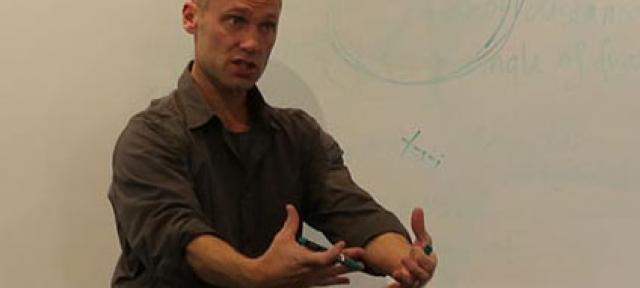In Conversation with Christoph Cox, Part 1

Dean of Faculty and Vice President for Academic Affairs discusses the new academic program and new student model.
Can you talk about how the new academic program and student experience model was developed?
CC: After the events of early 2019, a lot of us felt that what Hampshire really needed was for everybody to get together and figure out what our future was going to be. That's what happened last fall, and it really worked. We got together and talked across every constituency. It was an exciting process, and we came to a general agreement as a community. We decided that we need to focus our education around pressing contemporary issues. What would happen if we had a bunch of faculty, students, and staff working on a particular issue—thinking about white supremacy, thinking about anti-racism, or climate change?
And what's distinctive about the Hampshire approach is that it isn't just thinking. It's also doing and creating and failing and making. Students’ interests and perspectives change; and the same is true of faculty and staff. This new idea would give us all the experience of working together as a group on a particular project.
How’s it gone so far?
While a part of me wishes we had another year or more to prepare, I actually believe this is a great way to do it: just dive in and do it. That’s a very self-reflexive Hampshire way to do things. As an institution, we should be able operate the way our pedagogy does—flexibly and creatively.
There’s a lot of excitement and cross-disciplinary thinking going on. We have people coming together from all across the curriculum saying “Here’s where I come into this as a theatre maker,” or “Here’s how I think about it as a game designer.”
Groups of faculty and students can get together and say “OK, we're going to go work on this aspect of challenges to white supremacy, or this way of combating climate change.” Professor of Comparative Literature and Visual Studies Jennifer Bajorek has built a new course in which she’s asking students to think about climate change on a global scale –through art, literature, and philosophy. And to think about it critically and creatively in relationship to capitalism, imperialism, and colonialism.
There's a lot of Hampshire-esque entrepreneurialism in that answer.
Yeah, we don’t say to students, “First you take biology. Then you take chemistry. Then whatever. And then you come up with a research project.” It's like BAM! You're in the middle of a research project. You're digging in there right away.
I remember hearing that first-year students in a Natural Science course would be given a medical case right away and asked: What would you need to know in order to help this person? In our new academic program, we want to go beyond specifically scientific questions to ask: how did this person become sick? How is this illness related to social and economic factors—to geography, race, and poverty, for example?
Coming back to the question of entrepreneurship, at Hampshire entrepreneurship means building something that doesn’t yet exist: a non-profit, an activist organization, an arts organization, an assistive technology. For example, a colleague just told me about a recent alum who worked with a women’s health startup to design a “First Period Kit” as a gift package distributed for free to young girls starting menstruation in Pakistan and elsewhere. That’s entrepreneurship!
You learn content but also skills. The difference between what you're doing in college and what you're doing after college gets blurred. And yes, it's important for you to do the classes at Hampshire that fuel that work, but also that work becomes part of some of your classes. It's that kind of thing, and I think that's super important for students, particularly right now. It gives students so many different opportunities for what they want to do after college. It's not a matter of, “OK, I graduated. Now what do I do?”
How does that tie into your own attitudes around teaching?
I feel that my students should always be able to ask me—when we’re considering a particular text or idea—why does it matter? Why should I care? If I can't answer those questions, there's something wrong with what I’m doing. And I tell them that they should be able to answer those questions for themselves, too.
From my perspective, I think that’s where we're pushing Hampshire. We want faculty and students to ask: why does this matter, what’s it going to do? And to be able to answer those questions for themselves and others. This isn’t to say that everything has to be a matter of practical problem-solving. It's just to say that we have to be explicit about the significance of what we’re doing. “Why does thinking about democracy matter? Why does thinking about justice matter?” For a philosopher like me who sometimes teaches really abstract stuff like metaphysics, I should be able to explain what’s at stake in different theories about the nature of things. I think it's important for education to move toward really asking, “How is this going to make a change in the world?”
To know is not enough, perhaps?
CC: Yeah, totally! That phrase just keeps popping up in my head, because of how good it is to describe the ideal of Hampshire. I think it’s really like that. I’ve always been curious about what they had in mind when they came up with that phrase. But, no, you don't just sit around in classrooms and learn (though you do that, too). You also make and create and plan and change the world.

